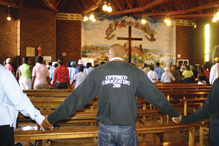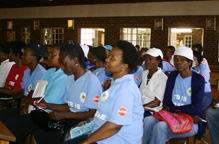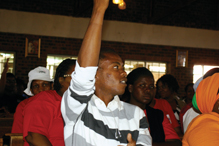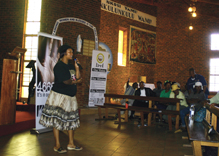
Community join hands to break the silence
Aug 27, 2008 – Breaking the silence by telling a roomful of people that you’re HIV-positive, in a community that still vilifies those who are positive, requires an enormous amount of courage.
This is precisely what happened today in Soshanguve, a large township outside Tshwane, when members of the community convened as part of the Nelson Mandela Foundation’s community conversation series. The series has visited a number of communities throughout the country to discuss the issues surrounding HIV/AIDS.
The aim of the community conversations is to provide a safe space and platform for people to discuss the particular challenges they face around HIV/AIDS and to try to find ways forward together.
The conversation, which was held at the Block H Roman Catholic Church, started with an unusual ground rule from the church’s priest: the word “condom” was not to be used during the dialogue.
As Paddy Nhlapo, of Cool Ideas, the NMF implementing partners, pointed out: “Every house has its rules and condoms are a big issue for the church.”
There was something poignantly ironic about having a dialogue about this virus – where prevention is the only “cure” – in a venue which represents an organisation that views protected sex as a sin.
It could hardly have been a more challenging environment in which to discuss the problems in the community surrounding HIV/AIDS, but the facilitation team, led by Sizwe Nkosi, using techniques designed for the conversations, managed to achieve resounding results.
As people started to break the silence and tell their stories, the buzz of muffled conversation halted and the only sounds that could be heard were the voice of the speaker and sounds of those overcome by what was being said.
People told stories of losing family and friends to AIDS-related diseases; some spoke about the suffering they had experienced at the hands of the community once their positive HIV status was discovered; others disclosed their own positive status for the first time during the dialogue; while some asked for forgiveness, knowing that, by remaining ignorant of their status, they had infected others.
“Thank God for the courage to stand here today and disclose my status,” said one participant. “I want to be able to educate people about HIV/AIDS, both positive and negative. I regret that I ever infected anyone. I’m not proud of what I did, but now I am proud that I know more about HIV/AIDS.”
“It’s difficult to hear of people who are treated badly at home because they have HIV,” said another participant. “Family is the one place you would expect to find love.”
The individual tales of those infected and affected by HIV/AIDS were a fitting reminder of how silence and ignorance about HIV is still one of the biggest challenges in prevention efforts.


